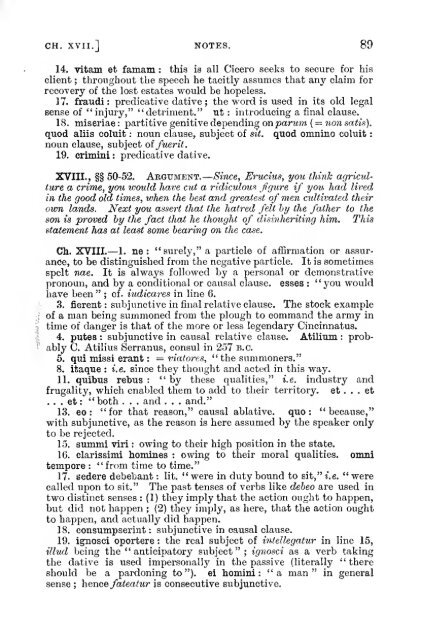Pro S. Roscio Amerino
Pro S. Roscio Amerino
Pro S. Roscio Amerino
You also want an ePaper? Increase the reach of your titles
YUMPU automatically turns print PDFs into web optimized ePapers that Google loves.
CH. XVII.] NOTES. 89<br />
14. vitam et famam : this is all Cicero seeks to secure for his<br />
client ; throughout the speech he tcacitly assumes that any claim for<br />
recovery of the lost estates would be hopeless.<br />
17. fraudi : predicative dative ; the word is used in its old legal<br />
sense of "injury," "detriment." ut : introducing a final clause.<br />
18. miseriae : partitive genitive depending onparum ( = non satis).<br />
quod aliis coluit : noun clause, subject of sit. quod omnino coluit<br />
noun clause, subject oifuerit.<br />
19. crimini : predicative dative.<br />
XVIII., §§ 50-52. Aegument.—Since, Erucius, you thinlc agriculture<br />
a crime, ymi ivould have cut a ridiculous figure if you had lived<br />
in the good old times, when the hest and greatest of men cultivated their<br />
own lands. Next you assert that the hatred felt hy the father to the<br />
son is proved hy the fact that he thought of disinheriting him. This<br />
etatement has at least some bearing on the case.<br />
Ch. XVIII.— 1. ne : "surely," a particle of afSrmation or assurance,<br />
to be distinguished from the negative particle. It is sometimes<br />
spelt nae. It is alwa^^s foUowed by a personal or demonstrative<br />
pronoun, and by a conditional or causal clause. esses : "you would<br />
have been " ; cf . iudicares in line 6.<br />
,j 3. fierent : subjunctivein finalrelativeclause. The stock example<br />
;' of a man being summoned from the plough to eommand the army in<br />
2 time of danger is that of the more or less legendary Cincinnatus.<br />
I 4. putes : subjunctive in causal relative clause. Atilium : probr<br />
ably C. Atilius Serranus, consul in 257 B.c.<br />
5. qui missi erant : =<br />
viafores, " the sumraoners."<br />
8. itaque : i.e. since they thought and acted in this way.<br />
11. quibus rebus : " by these qualities," i.e. industry and<br />
frugality, which enabled them to add to their territory.<br />
. . . et : " both . . . and . . . and."<br />
et . . . et<br />
13. eo : "for that reason," causal ablative. quo : " because,"<br />
with subjunctive, as the reason is here assumed by the speaker only<br />
to be rejected.<br />
15. summi viri : owing to their high position in the state.<br />
16. clarissimi homines : owing to their moral qualities. omni<br />
tempore : "from time to time."<br />
17. sedere debebant : lit. " were in duty bound to sit," i.e. " were<br />
called upon to sit." The past tenses of verbs like deheo are used in<br />
two distinct senses : (1) they imply that the action onght to happen,<br />
but did not liappen ; (2) they imply, as here, that the action ought<br />
to happen, and actually did happen.<br />
18. consumpserint : subjunctive in eausal clause.<br />
19. ig^nosci oportere : the real subject of inteUegatur in line 15,<br />
illud being the " anticipatory subject " ; ignosci as a verb taking<br />
the dative is used impersonally in the passive (literally " there<br />
should be a pardoning to "). ei homini : "a man " in general<br />
sense ; hencB fateatur is consecutive subjunctive.<br />
:

















